The 2020 Panhandle Row Crop Short Course was held Thursday, March 5. Extension Specialists from Florida and Georgia spoke to attendees providing production information and various management tips for row crops farmers. Continuing education units (CEUs) were offered at the event for those with a restricted use pesticide license (Florida and Georgia), as well as for Certified Crop Advisors. Despite thunderstorms and severe weather Wednesday night and into Thursday morning, we still had good turnout of 96 people. Attendees came from eleven Florida counties, six Georgia counties, and one Alabama county. The program featured eight presentations and a trade show of nineteen venders and organizations that provide products and services to the industry.
The focus of the Short Course was primarily on peanut and cotton production, but did overlap other crops regarding herbicides, pest management, pilot program research, and the market outlook. Specific topics included an update from the Florida Peanut Producers Association, the climate outlook over the next few months, an update regarding the first year of UF’s hemp pilot program plots in Quincy, pest management (nematodes, disease, and insects), the market outlook, and information regarding crop varieties. The following recap provides a short summary of what was discussed by each speaker, as well as direct links to download PDF (printable) versions of the presentations given at the event.
–
Industry Update
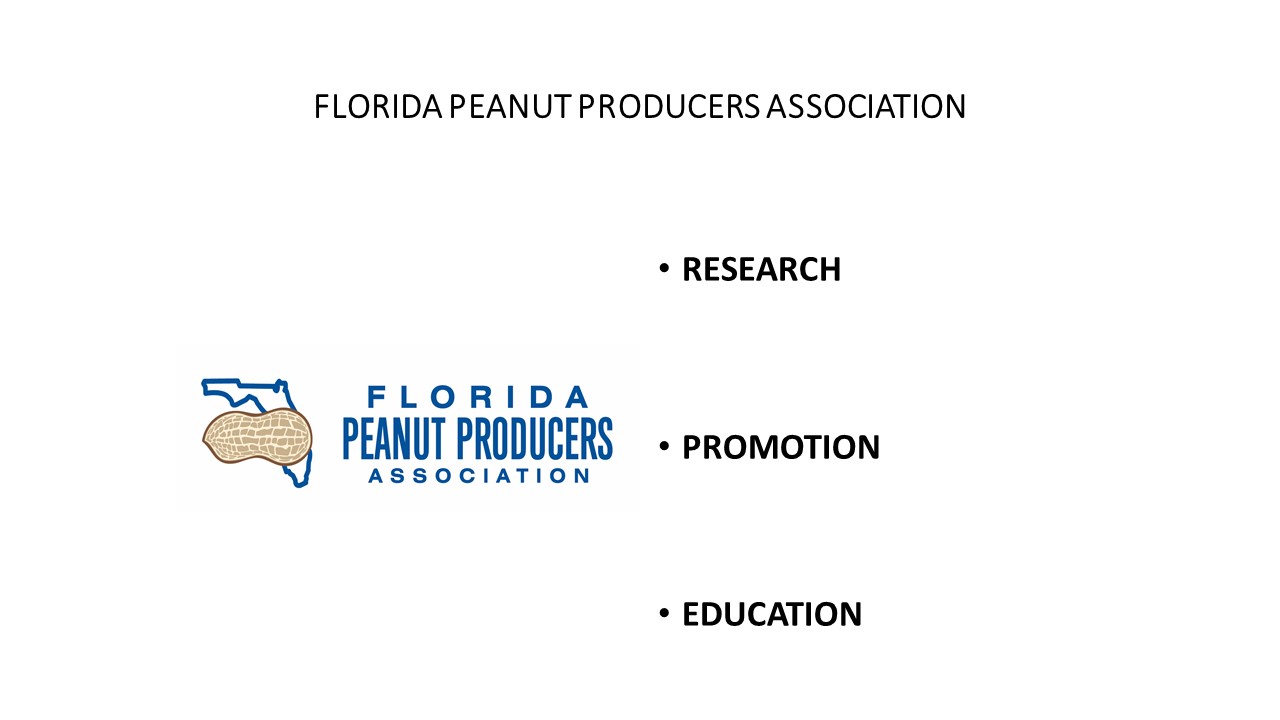 Ken Barton, Executive Director of the Florida Peanut Producers Association (FPPA) provided an update on the current status of the peanut industry, along with the goals of the FPPA.
Ken Barton, Executive Director of the Florida Peanut Producers Association (FPPA) provided an update on the current status of the peanut industry, along with the goals of the FPPA.
Presentation link: Barton – Florida Peanut Producers Update
–
Climate Outlook
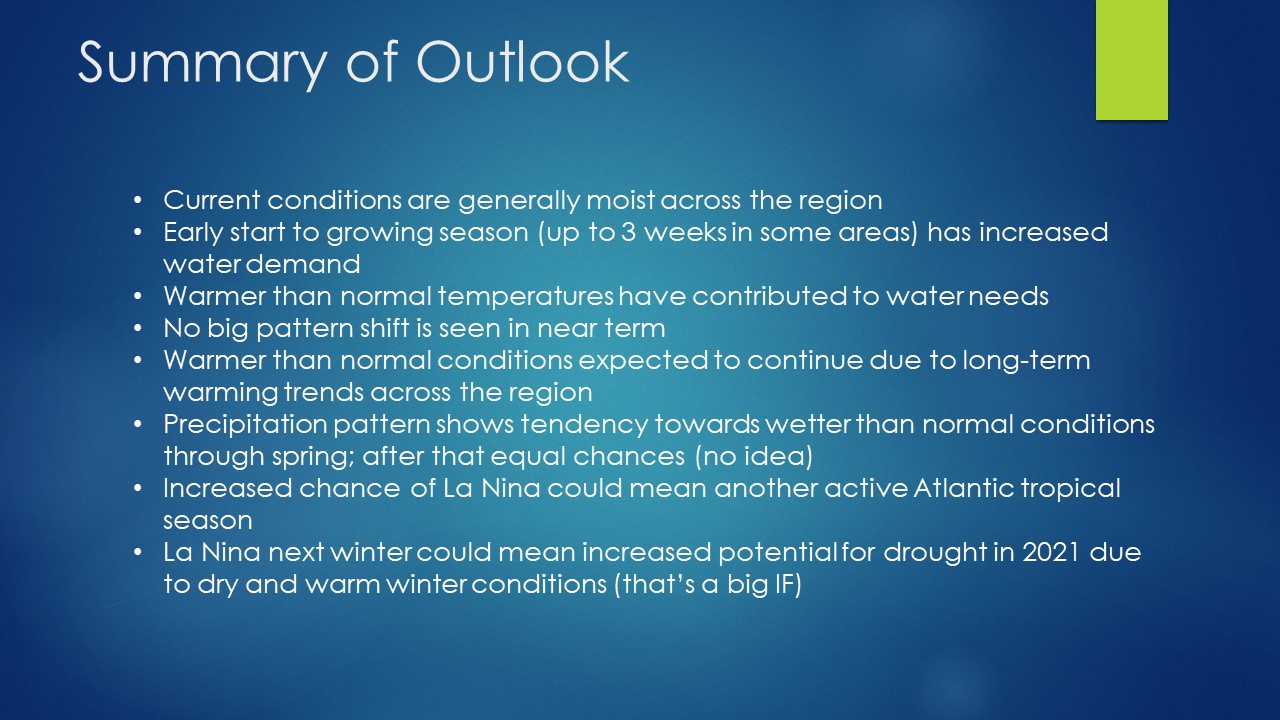 Dr. Pam Knox, Director of the UGA Weather Network and Agricultural Climatologist discussed the 2019 year in review with an overview of the daily temperatures in Marianna as well as our annual temperatures and precipitation for NW Florida. From the 2019, she segued into our expected 2020 outlook for the next three months. There was discussion of temperatures impacting fruiting trees, planting dates, and our immediate weather forecast.
Dr. Pam Knox, Director of the UGA Weather Network and Agricultural Climatologist discussed the 2019 year in review with an overview of the daily temperatures in Marianna as well as our annual temperatures and precipitation for NW Florida. From the 2019, she segued into our expected 2020 outlook for the next three months. There was discussion of temperatures impacting fruiting trees, planting dates, and our immediate weather forecast.
Presentation link: Knox- Southeast Spring Climate Outlook
–
Agronomic Practices Regarding Industrial Hemp Production: A Pilot Study in Florida
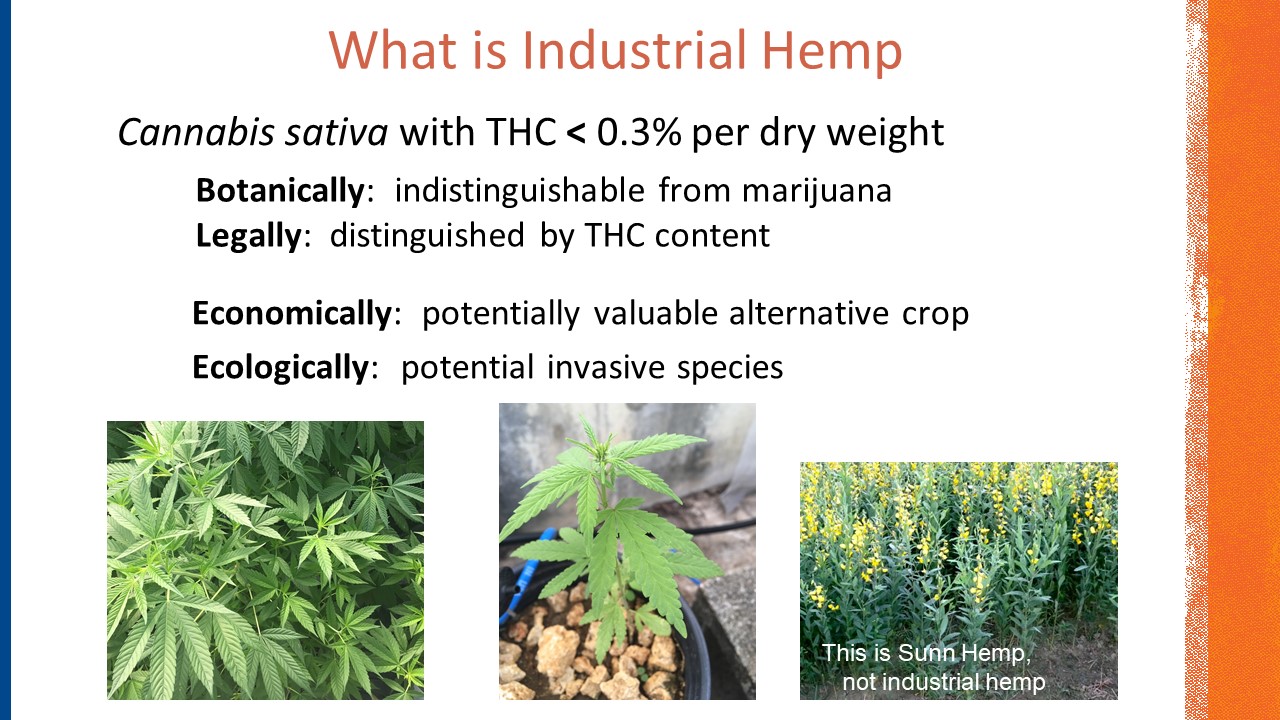 Dr. Josh Freeman, UF/IFAS Horticulture sciences specialist provided background on and defined industrial hemp. His talk focused on his work with the crop as part of UF’s pilot pogrom in 2019 at the North Florida Research and Education center in Quincy, Florida.
Dr. Josh Freeman, UF/IFAS Horticulture sciences specialist provided background on and defined industrial hemp. His talk focused on his work with the crop as part of UF’s pilot pogrom in 2019 at the North Florida Research and Education center in Quincy, Florida.
Presentation link: Freeman- Agronomic Practices Regarding Industrial Hemp Production for Cannabinoids: A Pilot Study in Florida
–
Nematode Management in Row Crops
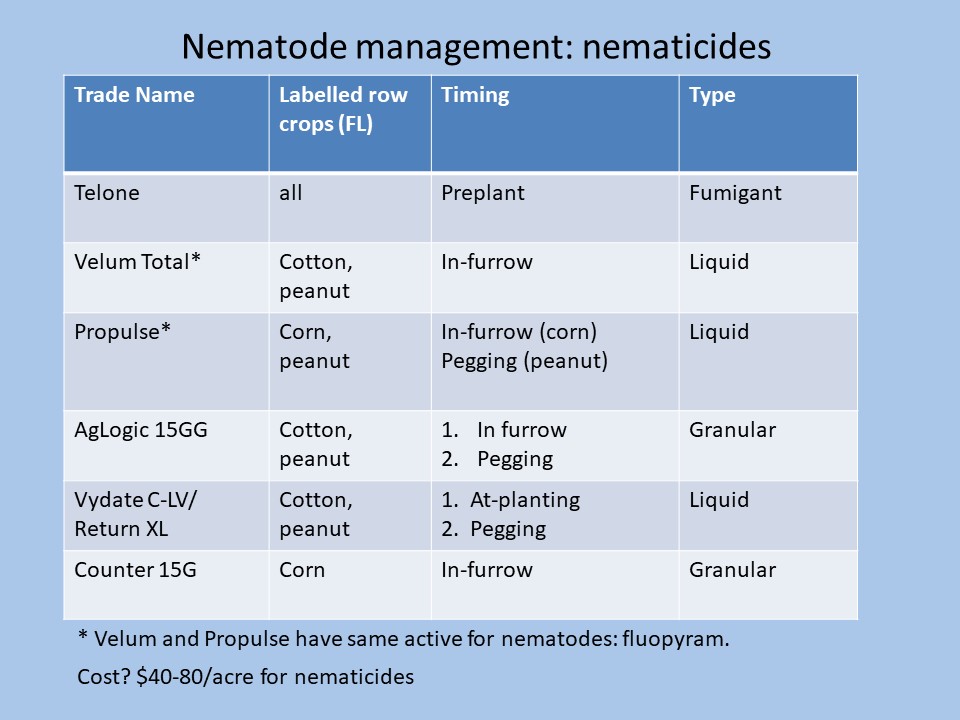 Dr. Zane Grabau, UF/IFAS Crop Nematologist outlined nematode management in terms of resistance varieties, crop rotation, and nemacticide use. His presentation had images and information pertaining to several of the most crop damaging nematode species: root-knots, sting and reniform. He discussed nematicide efficacy in several field trials that have taken place across North Florida, as well as seed treatment, granular, liquid, and fumigant product options.
Dr. Zane Grabau, UF/IFAS Crop Nematologist outlined nematode management in terms of resistance varieties, crop rotation, and nemacticide use. His presentation had images and information pertaining to several of the most crop damaging nematode species: root-knots, sting and reniform. He discussed nematicide efficacy in several field trials that have taken place across North Florida, as well as seed treatment, granular, liquid, and fumigant product options.
Presentation link: Grabau – Nematode Management in Row Crops
–
Crop Disease Management
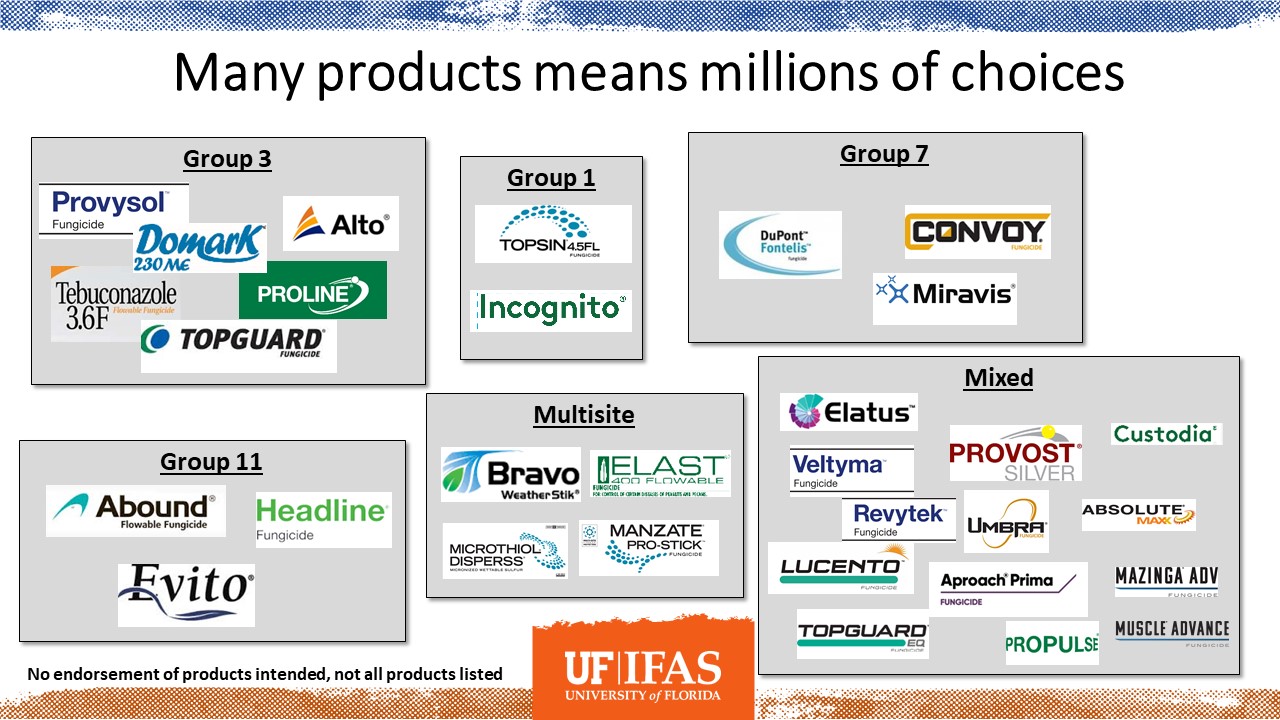 Dr. Nicholas Dufault, UF/IFAS Crop Pathologist discussed disease management in peanut. He referenced various PeanutRX programs and a number of crop trials across North Florida looking at disease control and product efficacy. He stressed the importance of identifying and knowing the diaseas that you are treating, and selecting the appropriate products for control. There are many products available on the market, rotating modes of action is key for resistance management. He concluded his talk with several new products that will be available in 2020 and 2021.
Dr. Nicholas Dufault, UF/IFAS Crop Pathologist discussed disease management in peanut. He referenced various PeanutRX programs and a number of crop trials across North Florida looking at disease control and product efficacy. He stressed the importance of identifying and knowing the diaseas that you are treating, and selecting the appropriate products for control. There are many products available on the market, rotating modes of action is key for resistance management. He concluded his talk with several new products that will be available in 2020 and 2021.
Presentation link: Dufault- Crop Disease Management
–
Peanut Insect Management
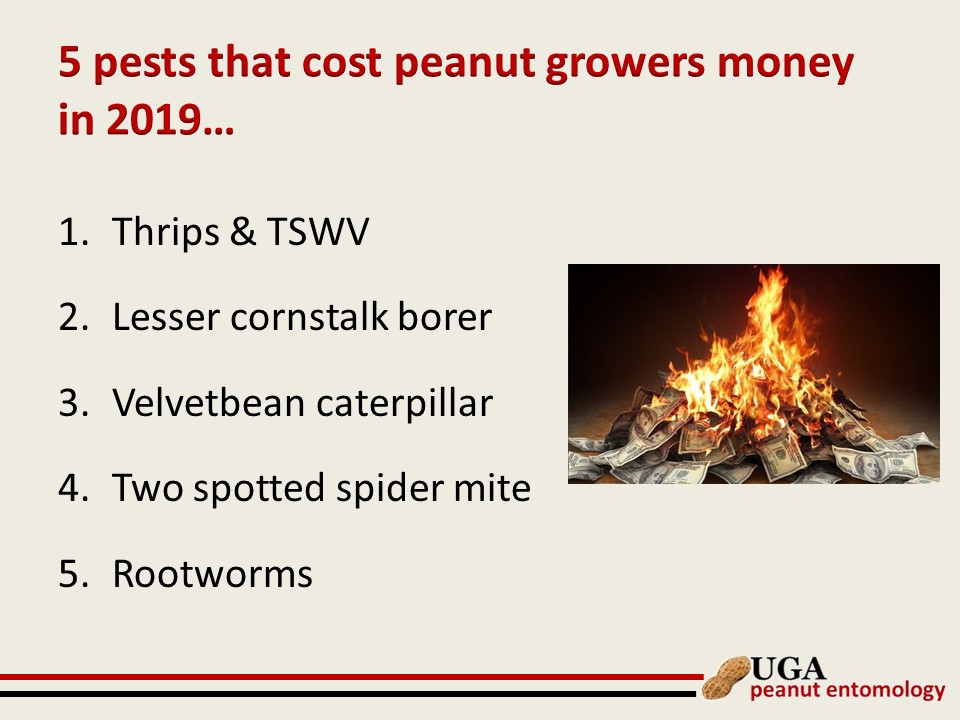 Dr. Mark Abney, UGA Peanut Entomologist discussed various insects and management techniques. He stressed that the most effective way to improve insect management is to scout your field, manage the crop, use the right tools, and to be timely and informed when making decisions. His presentation was largely focused on five key insects, causing the most problems in 2019 and likely troublesome for 2020 as well.
Dr. Mark Abney, UGA Peanut Entomologist discussed various insects and management techniques. He stressed that the most effective way to improve insect management is to scout your field, manage the crop, use the right tools, and to be timely and informed when making decisions. His presentation was largely focused on five key insects, causing the most problems in 2019 and likely troublesome for 2020 as well.
Presentation Link: Abney – Peanut Insect Management
–
Update on the Market
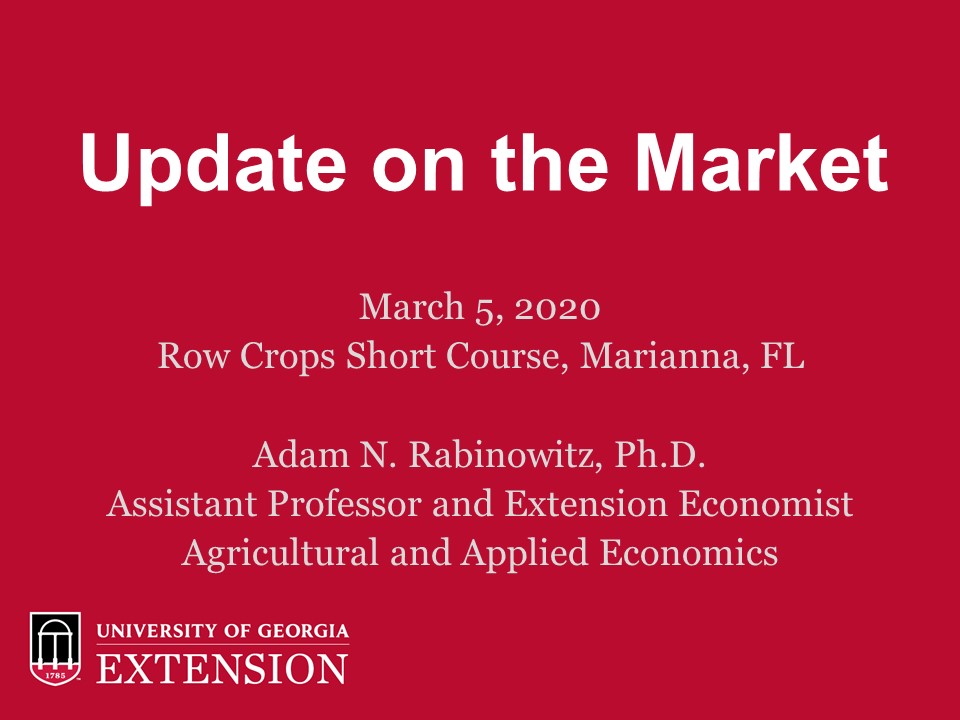 Dr. Adam Rabinowitz, UGA Economist provided an analysis of the crop commodity markets. He covered several commodities, their utilization within the market, and inputs. Understanding what factors drive the market and the projected revenues/costs associated with growing different crops will allow producers to make informed decisions. Based on this year’s cost and revenue projections, it is more important than ever to farm efficiently.
Dr. Adam Rabinowitz, UGA Economist provided an analysis of the crop commodity markets. He covered several commodities, their utilization within the market, and inputs. Understanding what factors drive the market and the projected revenues/costs associated with growing different crops will allow producers to make informed decisions. Based on this year’s cost and revenue projections, it is more important than ever to farm efficiently.
Presentation link: Rabinowitz- Update on the Market
–
Variety Performance (Peanut & Cotton)
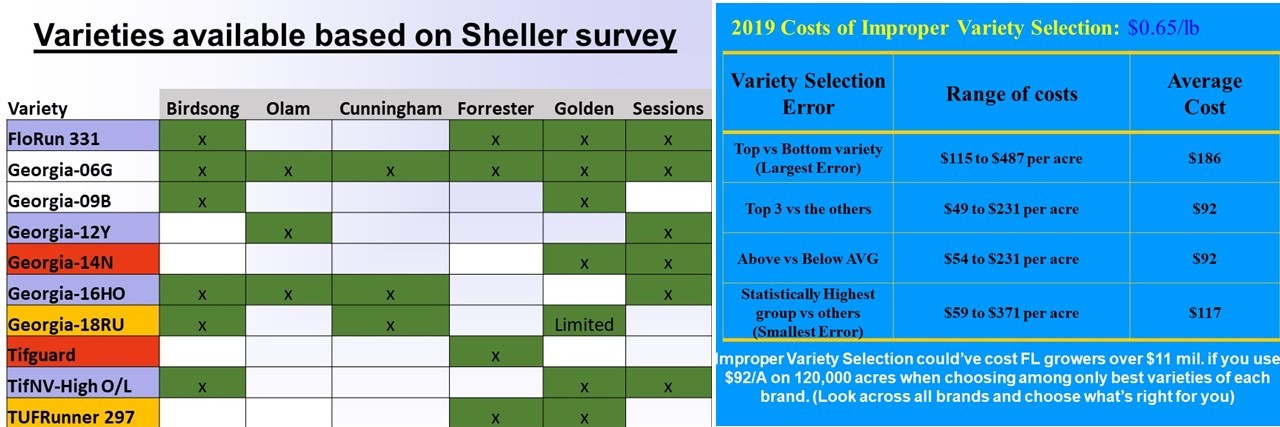 Drs. Barry Tillman and David Wright, UF/IFAS Agronomists shared information on peanut and cotton varieties and their performance. Information shared included both data from research stations and on-farm trials across Florida, Georgia and Alabama. Variety performance data from several different trial locations were shown to illustrate consistency of variety performance in low, mid, and high yielding environments.
Drs. Barry Tillman and David Wright, UF/IFAS Agronomists shared information on peanut and cotton varieties and their performance. Information shared included both data from research stations and on-farm trials across Florida, Georgia and Alabama. Variety performance data from several different trial locations were shown to illustrate consistency of variety performance in low, mid, and high yielding environments.
Presentation links: Tillman- Managing Peanut Varieties for Maximum Performance
Wright- Cotton Varieties and Performance
–
Sponsors and Trade Show Exhibitors
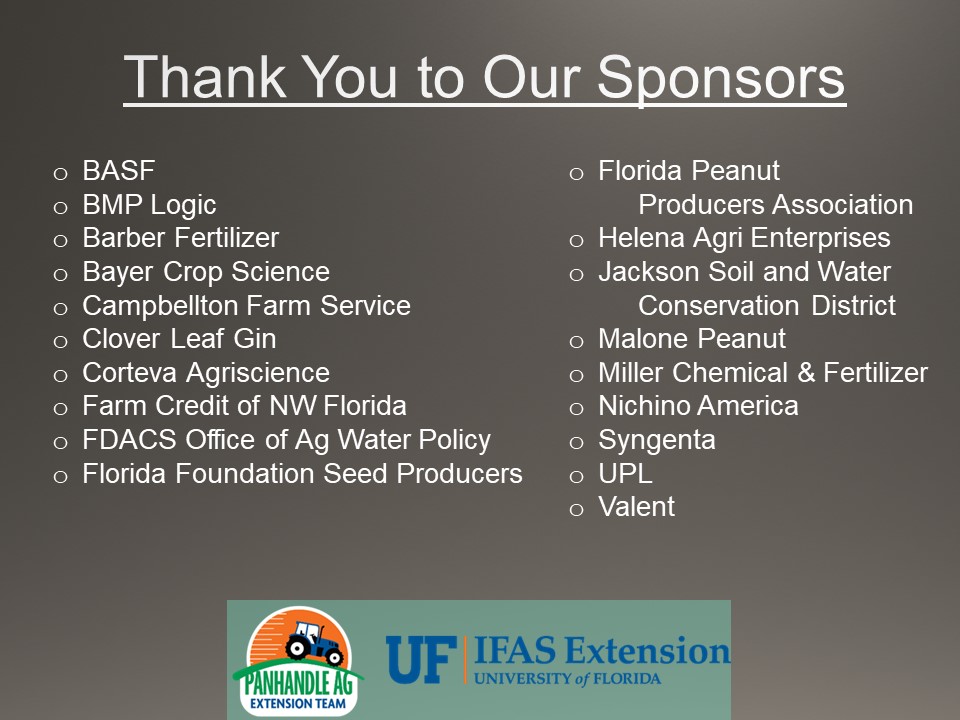 These 19 companies and organizations that provide products and services to crop farmers in the region took part in the Trade Show and made lunch possible for not only this event, but also the upcoming Peanut Field Day scheduled for August 20th.
These 19 companies and organizations that provide products and services to crop farmers in the region took part in the Trade Show and made lunch possible for not only this event, but also the upcoming Peanut Field Day scheduled for August 20th.
–
Upcoming Events
UF/IFAS Peanut Field Day – August 20
Several upcoming educational events pertaining to production agriculture planned across the Florida Panhandle have been suspended through the end of April to minimize the spread of the Corona Virus. Watch the newsletter for promotional materials regarding these and other events, or call the Extension Office in your county for more information.
- Provisional Nitrogen Fertilization Recommendation for Florida Cotton for the 2025 Season - June 20, 2025
- NFREC-Quincy Row Crop Field Day – July 21 - June 20, 2025
- NFREC-Marianna Peanut Field Day – August 14 - June 20, 2025
